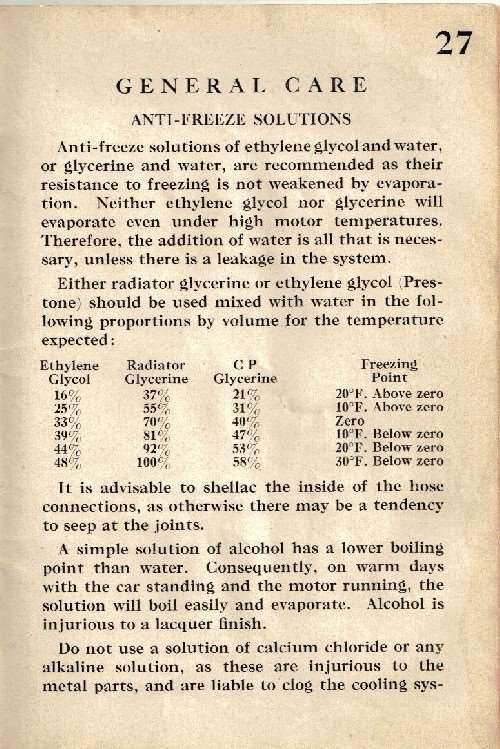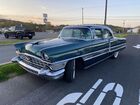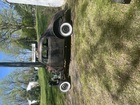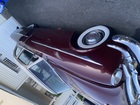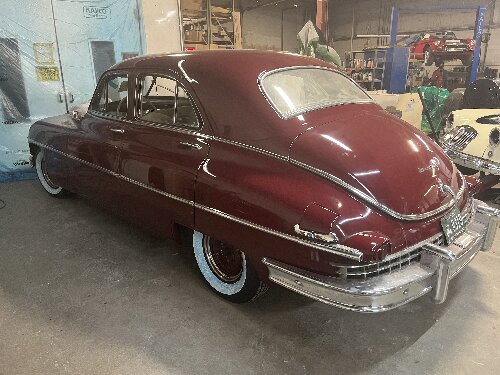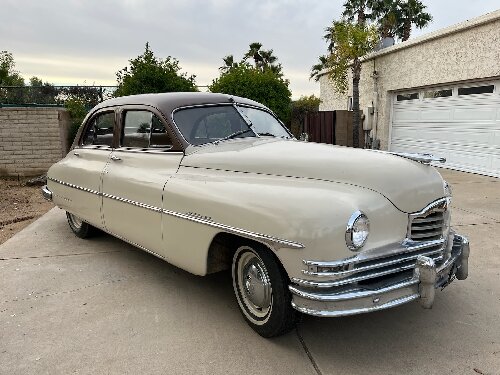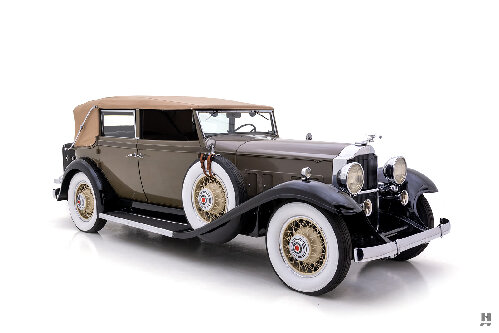|
Re: water/antifreeze
|
||||
|---|---|---|---|---|
|
Home away from home
|
Yes, at least have him drain the radiator and block. I hope there was no damage done by the freezing temps. He needs to use the old type permanent anti-freeze, not the new extended life types. Green, not yellow.
(o[]o)
Posted on: 2012/12/30 22:34
|
|||
|
We move toward
And make happen What occupies our mind... (W. Scherer) |
||||
|
||||
|
Re: water/antifreeze
|
||||
|---|---|---|---|---|
|
Forum Ambassador

|
He should have drained the system, or heated the garage. If it was an unheated but attached garage you may have gotten away with it. I agree with JW, if it is exposed to 27-28 degrees for a sufficient time that will result in a cracked cylinder block. And as JW says you want the traditional "green" antifreeze but you can either buy it full strength and mix it yourself to about 50/50, or buy the premixed stuff - same result either way. Here's hoping the damage hasn't already been done.
Posted on: 2012/12/30 23:46
|
|||
|
||||
|
Re: water/antifreeze
|
||||
|---|---|---|---|---|
|
Home away from home
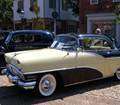
|
I believe that using antifreeze in old cars is a good idea, but I have to think that these cars were routinely tested by Packard for temperatures below zero. Having lived in communities in the White Mountains of Arizona and Northern California, my cars would sit outside in extremely cold weather and I had no problems with the blocks. You crack the block when you add cold water to an overheated engine without any coolant or water in the system. While most garages may get cold inside, they generally stay warmer than the outside temperature. Just to be on the safe side, you could probably cover the engine with a couple of old blankets if you wanted. After changing the coolant in the car, it's a good idea to start and run the car several times during the winter because that keeps the oil and coolant distributed throughout the engine. Let the car really warm up before shutting it off.
Posted on: 2012/12/31 8:38
|
|||
|
You can make a lot of really neat things from the parts left over after you rebuild your engine ...
|
||||
|
||||
|
Re: water/antifreeze
|
||||
|---|---|---|---|---|
|
Home away from home

|
These are pretty good tip sheets:
http://www.examiner.com/article/david-leger-s-tips-for-winterizing-your-classic-car http://briarcliffclassic.com/2011/12/winterizing-tips-for-your-classic-car/ http://www.timelessrides.com/blog/preservation/winterizing-your-classic-car
Posted on: 2012/12/31 8:42
|
|||
|
You can make a lot of really neat things from the parts left over after you rebuild your engine ...
|
||||
|
||||
|
Re: water/antifreeze
|
||||
|---|---|---|---|---|
|
Just can't stay away

|
after talking with him last night he said the former owner stated "there was a little bit of antifreeze in there" Probably should add some more at least. Also, on these cars is it just topped off to the top where you pour it in? He doesn't have a computer to ask these things.
I thought of another question--what kind of antifreeze did they have in 1935 anyway?
Posted on: 2012/12/31 8:53
|
|||
|
||||
|
Re: water/antifreeze
|
||||
|---|---|---|---|---|
|
Home away from home
|
As far as I know they used methanol or ethanol mixed with water. When I was young in the sixties, I used "home brewed" ethanol to keep my costs down owning an old Chevrolet 1949 (sorry!).
Tom
Posted on: 2012/12/31 9:18
|
|||
|
||||
|
Re: water/antifreeze
|
||||
|---|---|---|---|---|
|
Forum Ambassador

|
There were 3 types of antifreeze in use in 1935, methanol, glycerine, and ethylene glycol, all to be mixed with appropriate amounts of water. Although methanol had been the standard for many years, it had the disadvantage of evaporating due to it's low boiling point (about 160 F) and ethylene glycol rapidly became the favored material though methanol was still in use for a few years after WWII, most commonly as Zerone, the companion product to Zerex which was ethylene glycol based.
Doesn't sound like your friend knows much about cars, perhaps he should at a minimum buy a reprint of the owner's manual which among other things does discusses the various types of antifreeze. And yes, you add it at the radiator cap and then run the engine for a few minutes to circulate and mix it. As to the comment that I have to think that these cars were routinely tested by Packard for temperatures below zero, that's no doubt true, but NOT without antifreeze. Water expands slightly just below the freezing point and that's the reason it cracks blocks when frozen solid. And you can crack blocks by adding cold water too rapidly to a very overheated engine - those cracks usually occur at the exhaust valve seats and can progress across and down the cylinder walls whereas freeze cracks usually occur at the water jackets. Page from the 34 Eight owner's manual attached. The corresponding page in the 35 and 36 owner's manual is essentiall the same except it eliminates the reference to C.P. (chemically pure) glycerine.
Posted on: 2012/12/31 9:27
|
|||
|
||||
|
Re: water/antifreeze
|
||||
|---|---|---|---|---|
|
Home away from home

|
Dear Jesse:
If the ground wasn't frozen and there were no frozen puddles or ponds then he is probably okay. The radiator will freeze first. I have seen cars freeze over a sub-zero weekend, but only the radiator. The rest became slushy. There is a scientific formula to calculate the rate of freeze up if you are so inclined. The Russians used that stuff for building ice roads upon which they ran tractor trailers and even railroads over open water during winter. The system should not be stored empty because it will rust and the radiator will be ruined. The best fill level is even with the top of the fins which is lower than when new due to hot spots and such that occur with age and cause turbulence. Some cars will reach a level lower than that and stop losing water out the overflow. So a working temperature gauge is a must.
Posted on: 2012/12/31 16:46
|
|||
|
||||
|
Re: water/antifreeze
|
||||
|---|---|---|---|---|
|
Home away from home
|
The above gents give good advice, and i agree especially with Mssrs. Bumble, post # 4 above--tho' it's better to never start an engine unless you're going to drive 20 miles and get the oil hot enough to avoid sludge, varnish and carbonic acid--- and Cole, #9. A car has to be exposed to two consecutive nights of a hard freeze, 30 or below, to risk a cracked block, but why take chances? The radiator will expand slightly, but if cold enough, and the slush hardens, your block won't give.
Antifreeze is wretched stuff, toxic, but sweet and deadly to small children and pets. It also leaves a film on cooling system passages inhibiting heat transfer, according to a Chrysler engineeer writing in the Auburn-Cord-Duesenberg newsletter years ago, and breaks down after two years even in an unopened jug. Conventional green antifreeze should be drained and replaced every two years. But unless you live in Siberia or Duluth, you don't need a 50-50 mix. Check the chart on the jug for the lowest expected temperature in your region. And use ONLY soft water, never distilled, which is ion-hungry and leaches minerals, like solder, from your cooling system. Thankfully, in the greater SF/Oakland Bay Area, we can and do get by without antifreeze, just soft water and a quality rust and corrosion inhibitor like www.no-rosion.com which i'm a big fan of and if you order some tell Jay Ross a black '47 Super Clipper in Walnut Creek sent you. When i find a good product for our survivors from a company that goes the extra mile, i believe in spreading the word, otherwise we're stuck with naught but generic crap for modern Kleenex cars. Running straight water also lets you advance your timing another notch for performance and fuel economy. Any car will run cooler with just straight water and a quality rust inhibitor, than with antifreeze, all else being equal. Doing so is vital in race cars with their tiny frontal area, tho' they may put a teaspoon of the stuff in their system so they can get away with their antifreeze sponsor decal. If your friend's car's been neglected awhile, it can't hurt to pour a couple pints of kerosene and two pounds of Arm & Hammer washing soda (NOT baking soda!) in the cooling system, drive for a dozen miles, then flush with a garden hose. Run a coat hangar or piece of welding rod in the opened drain plug at the left rear of the block to get any loose sediment out. If you suspect decades of deferred maintenance, he may have to remove the radiator hoses, thermostat and back flush away. You didn't mention which model your friend's Packard is. If it's been awhile, it's a good idea to check cylinder head torque warm if iron, cold if aluminum, and the manifold bolts and nuts. This was part of a complete tune up in the day. Your friend sounds like a newbie, so assure him so long as he keeps oil and water in his lubed, tuned Packard and regardless of its thorough engineering, drives it like the old car it is, not a Taurus, Camry or Accord, he'll be able to enjoy it for perpetuity. For newer cars with air conditioning, even in Scottsdale or LA in August, you need to use 15% antifreeze merely to keep the heater core from freezing. To a grand, healthy, relaxed 2013 to all here gathered on the finest automotive website for the world's consistently finest production car, 100 years since Packard's fabled 525-ci Six was renamed the Model 48 for its third year, a model that as much as any cemented the Company's name in the automotive firmament. And why aren't we hearing from any 1911-15 Six owners?
Posted on: 2012/12/31 17:22
|
|||
|
||||

 (176.72 KB)
(176.72 KB)